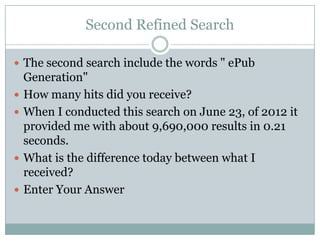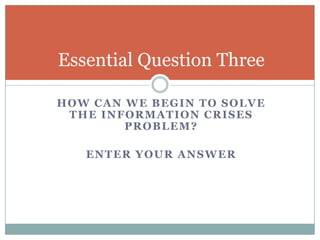Accessing information
- 1. Google Forms and Search Engines ACTIVITY ONE ACCESSING DIGITAL CONTENT
- 2. Activity One Directions To participate in this activity you will need to enter the Google Forms Workspace. Once you enter the workspace you will see a Google search engine at the top left hand corner of the page. Below the search engine is a Google docs form. Use the search engine to search terms. Use Google Forms to Answer Questions Do not submit until all questions have been prompted and answered
- 3. Essential Question HOW MUCH IS INFORMATION EXPANDING ON THE INTERNET DAILY WEEKLY MONTHLY YEARLY
- 4. Search Engine Experiment LET US EXPERIMENT WITH HOW ACCESSING INFORMATION AFFECTS US NOW. TO RUN OUR EXPERIMENT TYPE THE TERM "EPUB" INTO YOUR GOOGLE SEARCH ENGINE.
- 5. First Search Results How many hits for the term "ePub" did you receive? Enter Answer on Google Form When I performed this search on June 23, of 2012 I received about 21,500,000 results in 0.21 seconds. I was first introduced to the term ePub in the year 2011 and very little information could be found.
- 6. Essential Question Two HOW DO YOU SUPPOSE THAT IN ONE YEAR'S TIME A VIRTUALLY UNKNOWN TERM LIKE EPUB HAS EVOLVED TO THIS MOMENT TO OVER 21 MILLION C O N T R I B U T OR S , A N D G R O W I N G EXPONENTIALLY? ENTER ANSWER ON GOOGLE FORMS
- 7. Second Search Results "How long it would take an individual to read and access 21 million artifacts at your immediate disposal? Enter Your Answer in Google Forms
- 8. Second Refined Search The second search include the words " ePub Generation" How many hits did you receive? When I conducted this search on June 23, of 2012 it provided me with about 9,690,000 results in 0.21 seconds. What is the difference today between what I received? Enter Your Answer
- 9. Conclusion Possibly we could determine the rate of information expansion by comparing our data over time. What does it matter? These overwhelming numbers of contributors in online search engines like Google creates a new kind of problem, a crises in information problem.
- 10. Essential Question Three HOW CAN WE BEGIN TO SOLVE THE INFORMATION CRISES PROBLEM? ENTER YOUR ANSWER
- 11. Let’s Look at Our Problem Information is Fragmented
- 12. New Skills Are Required Knowing how, when, and where to access information on the Internet will grow to be an increasingly significant factor of digital media literacy. The availability of information resources and search technologies is expanding rapidly increasing the importance of effectively knowing how to access and reduce digital information into reliable forms of content extraction.












